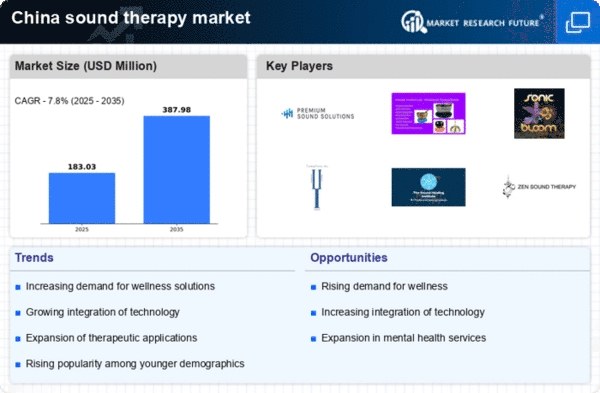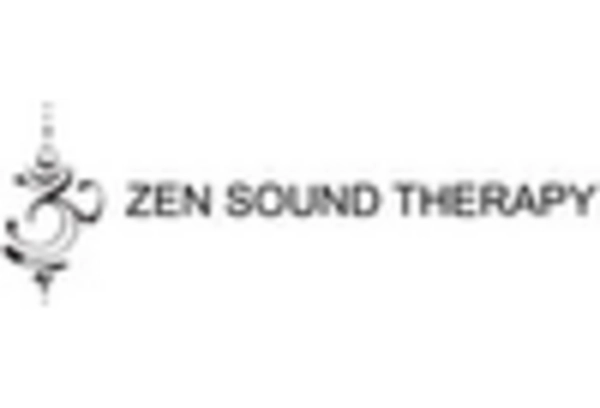Increasing Awareness of Mental Health
The sound therapy market in China is experiencing growth due to a heightened awareness of mental health issues among the population. As individuals increasingly recognize the importance of mental well-being, there is a growing demand for alternative therapies, including sound therapy. Reports indicate that approximately 17% of the Chinese population suffers from mental health disorders, which has led to a surge in interest in therapeutic practices that promote relaxation and stress relief. This trend is likely to drive the sound therapy market as more people seek effective solutions to manage anxiety and depression. Furthermore, the integration of sound therapy into wellness programs in corporate settings is becoming more prevalent, suggesting a potential expansion of the market as businesses prioritize employee mental health. The sound therapy market is thus positioned to benefit from this increasing focus on mental health awareness.
Rising Demand for Stress Relief Solutions
The fast-paced lifestyle in urban areas of China has led to a significant rise in stress-related issues, driving demand for effective stress relief solutions. The sound therapy market is well-positioned to cater to this need, as sound therapy is recognized for its ability to promote relaxation and reduce stress levels. Market analysis suggests that the demand for sound therapy services has increased by approximately 25% in major cities, reflecting a shift towards holistic approaches to health and wellness. As more individuals seek out sound therapy as a means to cope with daily stressors, the market is likely to expand. This trend indicates a growing acceptance of sound therapy as a legitimate form of treatment, further solidifying its role within the sound therapy market.
Technological Advancements in Sound Therapy
Technological innovations are playing a crucial role in the evolution of the sound therapy market in China. The introduction of advanced sound therapy devices and applications has made these therapies more accessible to a broader audience. For instance, the development of mobile applications that offer guided sound therapy sessions has gained popularity, particularly among younger demographics. This trend suggests that technology is not only enhancing the user experience but also expanding the reach of sound therapy services. As the market continues to embrace these advancements, it is likely to attract a diverse clientele, thereby contributing to the overall growth of the sound therapy market. The integration of technology may also facilitate better tracking of therapy outcomes, further legitimizing sound therapy as a viable treatment option.
Government Support for Alternative Therapies
In recent years, the Chinese government has shown a growing interest in promoting alternative therapies, including sound therapy, as part of a broader strategy to enhance public health. Initiatives aimed at integrating traditional Chinese medicine with modern therapeutic practices have created a favorable environment for the sound therapy market. Government funding and support for research into the efficacy of sound therapy could potentially lead to increased acceptance and utilization of these practices among healthcare providers. Additionally, the promotion of wellness tourism in China, which often includes sound therapy as a key component, may further stimulate market growth. The sound therapy market stands to gain from these supportive policies, as they encourage the exploration and adoption of innovative therapeutic approaches.
Cultural Acceptance of Sound Healing Practices
Cultural factors significantly influence the sound therapy market in China, where traditional practices such as music therapy and meditation have long been valued. The increasing acceptance of sound healing practices within the broader context of wellness and self-care is likely to bolster the market. As more individuals turn to sound therapy as a complementary approach to conventional medicine, the market is expected to grow. This cultural shift is reflected in the rising number of wellness centers and retreats that incorporate sound therapy into their offerings. Furthermore, educational initiatives aimed at promoting the benefits of sound therapy are likely to enhance public understanding and acceptance, thereby driving demand. The sound therapy market is thus poised to benefit from this cultural embrace of sound healing.

















